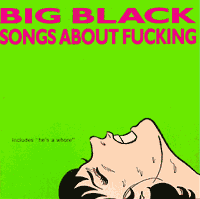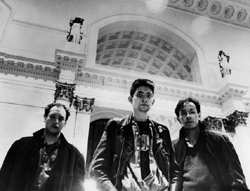
|
| You
think Manson and Reznor and their black-clad brethren are scary? Think
Orgy and Korn rock hard? When it comes to fear, hate, disgust and sheer
sonic horror, none of those pussies have anything on Big Black, the once
and future lords of squalling guitars and squalid viewpoints. Evil junkie
geek genius Steve Albini
convened what was probably the most nihilistic band in history somewhere
outside of Chicago in 1982,
making a few EPs (later consolidated into "The Hammer Party" disc) before
settling on a lineup of Albini and Santiago Durango on guitar and Dave
Riley on bass, along with a revolving series of drum machines, most of
them named "Roland."
Specializing mostly in in EPs and singles, the band's first full-length album was 1985's "Atomizer," a towering achievement in sheer hatred. Listen to the digitized guitar screams on "Passing Complexion"; or "Kerosene," a paean to going-nowhere rage ("I was born in this town/Lived here my whole life/nothing to do but sit around home, stare at the walls/and wait till we die") with brooding basslines circling around spark-shooting guitars. But it was not just the audial horror that made Big Black's songs chilling; there was the subject matter, too. Not only did Albini tell tales of mob hit men, coma victims, murderous rednecks, small-town arsonists and corrupt private dicks—he told them in the first person and grabbed most of them right out of the headlines. The most disturbing example of this was "Atomizer"'s "Jordan, Minnesota," in which Albini narrates the story of a child-molestation ring that was rampant there during the '70s. The jackhammering music overlaid with Albini's grunts, squeals and hollers of "This is Jordan! We do what we like!" makes one feel profoundly unclean long after the abrupt finish. Soon after "Songs About Fucking" was released, Durango dropped out of the band to go to law school (which got him credited as "Melvin Belli" in the liner notes) and Albini dissolved the band to start Rapeman, then broke them up and founded Shellac. These days, most of his time is spent producing and/or engineering a list of bands as long as his scarred arm, including P.J. Harvey, Nirvana, Dirty Three, Urge Overkill, the Jon Spencer Blues Explosion—even a Tom Petty tribute and the latest Nine Inch Nails. Hell, it's one way to make the young whippersnappers write you a check after each album.
HEAR IT: |
 |
 The
The  Unlike
most bands,
Unlike
most bands,